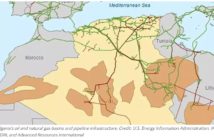By Eurasia Review
Algerian authorities have increasingly clamped down on efforts to form independent unions and to organize and participate in peaceful protests and worker strikes. Authorities have blocked demonstrations, arbitrarily arrested trade unionists, and prosecuted some of them on criminal charges which appear to have little basis in fact or are based on the peaceful exercise of their union activities.
Most recently, on September 29, 2013, the police violently dispersed a peaceful protest organized by the Contractual Workers Union in front of the government compound in Algiers and arrested 20 people, then released them later in the day.
“Algeria claims to be on a path to political reform, but then it turns around and menaces independent unions that seek social justice and better job conditions,” said Joe Stork, acting Middle East and North Africa director at Human Rights Watch. “Workers should not have to risk being fired or thrown in prison for participating in peaceful union activities.”
The result of the crackdown has been a climate of intimidation and fear that inhibits the development of independent trade unions alongside the existing state-supported unions, Human Rights Watch said. Human Rights Watch interviewed 20 union activists about the tactics the authorities use to curtail union activities during strikes, peaceful protests or indoor gatherings. Authorities have dismissed government workers after peaceful strikes and imprisoned union leaders on politically motivated charges. Algerian authorities should stop putting obstacles in the way of independent unions, Human Rights Watch said.
On April 25, Human Rights Watch sent a letter to the Algerian ministers of justice and interior requesting information about specific incidents and cases in which it appeared that authorities had violated the right of trade unionists and workers to engage in peaceful union activities. More than five months later, the ministers have not replied.
Algerian authorities engage in administrative maneuvers designed to withhold legal status from independent unions. The law on legalizing new unions requires these groups only to notify the authorities that they exist, not to get permission to form. But authorities sometimes refuse to issue a receipt proving they have been notified.
The Union of Higher Education Teachers in Solidarity (Syndicat des Enseignants du Supérieur Solidaires), for example, filed its papers on January 19, 2012. But it received no receipt at the time and has yet to receive an answer from the government, which means it cannot legally operate.
The National Autonomous Union of Postal Workers (Syndicat National Autonome des Postiers – SNAP) notified the authorities three times – on July 2, 2012, on September 13, 2012, and on March 3, 2013 – but the authorities never issued a receipt. The union still lacks legal status.
The rights to freedom of association, collective bargaining, and to strike are enshrined in International Labour Organization (ILO) conventions, to which Algeria is a party. Algeria also has obligations under the African Charter on Human and Peoples’ Rights and the International Covenant on Civil and Political Rights (ICCPR), which guarantee the right to freedom of association and assembly, and under the International Covenant on Economic Social and Cultural Rights (ICESCR), which protects specific rights related to freedom of association and trade union membership.
Article 2 of ILO Convention 87 on the right to freedom of association and protection of the right to organize, stipulates that workers and employers, without distinction, shall have the right to establish and, subject only to the rules of the organization concerned, to join organizations of their own choosing without previous authorization.
“Algeria’s largest workers’ union, the General Union of Algerian Workers, played a proud role in Algeria’s independence a half-century ago,” Stork said. “It is long past the time for Algeria to allow other unions to flourish too.”






